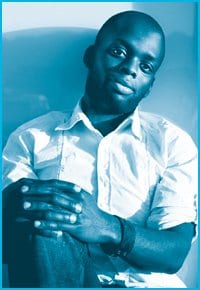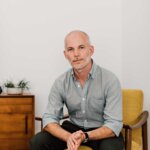If I cum in the woods and no one is watching, was it really sex? Or is sex more than orgasm, after all? It’s time to consider the social tint to fucking and the very real health issues that follow. Euphoria, this month’s queer buzz word, is a massive local conference/festival aiming to do just that. And leading the way (though he prefers the word “coordinator”) is Paul Adomako.
Like so many Vancouverites, Adomako came to the West Coast at a crossroads in his life. His lease was up, a contract had ended and three glasses of encouraging champagne had been drunk when a friend booked him a ticket to Van. He was on the plane in two weeks.
By the end of last March, Adomako, through AIDS Vancouver, landed his current position as coordinator of Euphoria.
Hamilton-raised and educated at Guelph where he earned two degrees in gerontology (the study of old age and ageing), Adomako takes on this job with a wealth of experience and a sharp, empathetic eye for what needs to be changed. In this case, the target is sexual health and gay men. In a “post-AIDS” Vancouver that is so urgently not post-AIDS, a rude awakening is just what the doctor ordered.
Environmental, race and gerentological issues, along with union struggles, were Adomako’s focus before moving to Vancouver. And his eclectic past feeds nicely into the holistic, interconnected approach that Euphoria promises.
That approach-wherein factors such as mental environment are taken as seriously as biological components-raises eyebrows. Wary of the badgering crystal-healer’s cackle and wimpy aromatherapy, we cringe from any prescription that doesn’t come in a pill.
“There’s a lot of skepticism around the holistic,” says Adomako, “It’s not validated.” But, if we admit that sex is social (and this, above all, we must admit) then it is irresponsible to pretend that sexual health is not also a social issue. And that means resources (clinics, counselling, shelters, job centres) must overlap, interconnect. “No one organization can satisfy all the needs,” Adomako insists. “So, one of the things that has to happen here, and it is happening in Vancouver, is organizations have to partner. There’s just no other way that it can work.”
One-note programs are a dying breed in the sexual health department. “Use a condom and you’re hunky dorry” isn’t saying much, after all. One-note programs don’t address drug-abuse or self-esteem issues. Racial and ethnic minorities are doubly missed by such blind-spots. And today’s target audience doesn’t respond well to scare-tactics either. More subtle and more informed approaches are necessary to reach the next generation.
That means creating a more complex language around health, too. Gay men’s health has been polarized by the words ‘positive’ and ‘negative’ for so long. But lives sprawl beyond binary equations. And health issues, we begin to discover, are about lives-whole lives.
Phillip Banks at AIDS Vancouver agrees. Euphoria, Banks says, will embrace “a holistic approach that recognizes that we are complex creatures whose health is multifaceted and influenced by many complex factors.” Now that HIV/AIDS has become a white noise for so many, “What’s going to be the new binding element?” wonders Adomako. “Quality of life?”
In that case, we’d best figure out what folks are up to, socially speaking. Television certainly can’t be trusted to portray the myriad selves that exist under that ungainly rainbow umbrella.
Newspapers have their own agendas, too. Only the public can properly speak its own mind. Thus we arrive at stage one of Euphoria’s program-the focus group.
Due to time constraints, the original schedule for these focus groups has been extended. An estimated 10-15 groups, consisting of 10 bodies apiece, will begin running mid-May and wrap up a month later. These facilitated conversations will build community while searching out unique strains within that community as well. Their input will go on to inform future Euphorias-the goal being to make this an annual, ever-growing, smorgasbord of gay male sex culture. Who could ask for anything more?
Well, we could always ask for more funding. “Gayway [the new gay men’s health centre] is not an indication that there is more money for gay men’s health,” warns Phillip Banks. “Gayway operates on the same amount of funding that was given to Man to Man, our previous incarnation which was a gay men’s HIV prevention program at AIDS Vancouver. That funding has not increased significantly since 1995.”
Funding is focussed on general HIV prevention, leaving few funds for gay-male-specific vulnerabilities. Banks says he works to “creatively utilize these HIV prevention resources to address gay men’s health issues.” A holistic approach would acknowledge that gay men aren’t necessarily covered by general HIV campaigns. However, “provincial and federal governments will not embrace a holistic approach,” he laments. “Not now anyway. And I believe not in my lifetime.”
Euphoria and other holistic advocates such as Gayway are working toward change, however. “The advent of Gayway has forced a shift in the language used by funders and programmers,” says Banks. “Hopefully this will lead to a shift in how we are actually funded.”
Local health organizations have banded together to make this change. Major presenters for Euphoria include most of the usual suspects: AIDS Vancouver; BC Persons with AIDS; BC Centre for Disease Control; the Community-Based Research Centre; YouthCO; and Asia. Also involved in a large capacity is the newer organization, Gayway. Gayway’s mandate for holistic health approaches appears to be in sympathy with Euphoria’s.
The events that make up Euphoria are threefold. An opening launch, Fri Jun 11, kick-starts the party at the Vancouver Art Gallery where the price of admission to the Andy Warhol exhibit will be happily waived.
The Main Event, Euphoria itself, swings into gear that Saturday, running from 10 am-6 pm. Workshops, community panels (including a diversity panel after lunch) and a community fair busting with indoor and outdoor booths will cram Robson Square with queer bodies all day. Entertainment at the event will feature House of Berdashe. Food will be provided by Potluck Catering, an East Side employment training program.
Things will wind down in style at the closing celebration. For the event, Euphoria organizers have booked the top floor Marques Room and beautiful rooftop terrace at the Scotia Bank Dance Centre.
All three events are free of charge and open to all, especially the 50-75 volunteers needed to run them (there’s that feel-good interconnected vibe again).
Those venues, it bears noting, are big scores. They are central, prominent platforms for some good old-fashioned soap-box yelling. Or refined murmuring over wine-and-cheese, as the case may be. However you do it, the point is participation: Make it your own.
EUPHORIA 2004.
Gay guys coming together Jun 11-12.


 Why you can trust Xtra
Why you can trust Xtra


